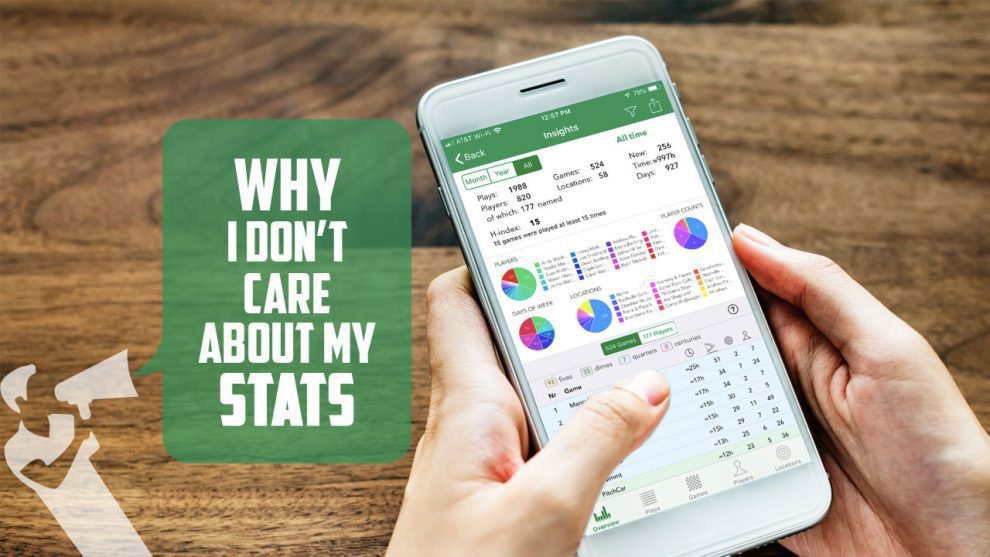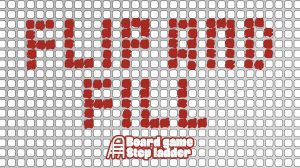Lately, I’ve noticed a rising trend of people meticulously tracking every little minute detail of every board game they play. From their favorite color, to the location where games were played, to their score, and also how many times they’ve played certain games, there’s apparently no limit to how much data they can collect about their personal gaming habits. The problem is, I have yet to find a case where any of this collected data was actually useful or helpful in any meaningful way.
But before I get into what it is that bothers me about this trend, it would make sense to try and understand why people do it in the first place. It’s not a topic that many people have taken the time to write about. For instance, try plugging in “why should I track my board game stats?” into Google and you’ll find a lot of advertisements for various apps that will allow you to track your stats or people writing questions about the apps, but what you won’t find are any articles wherein people actually describe the benefits of doing so. I find it hard to believe there has not been a single editorial piece written wherein someone lays out the reasons why you should track your stats. So, I asked around. Why DO you track your stats? Here are a few of the reasons why:
- To track performance over time
- To determine which games get played the most frequently
- To remember the names of people you might have played with in the past
- To detect trends in the types of games that you play
- Because you may be a person that collects things and collecting plays is just another thing to collect
- To track money spent versus value obtained from playing the games
One of the most in-depth stats tracking apps out there is Board Game Stats and, boy, does it have a lot of features. Among its many features are the abilities to:
- Enter the names of players along with their chosen player colors and their final scores
- Assign ranks to each player
- Upload your recorded plays to Boardgamegeek.com
- Upload your recorded plays to various social media accounts
- View winning streaks
- Compare player performance in chart form
… and a whole host of others. It’s no wonder that so many people are such big fans of this particular app. It records and compiles a lot of information and it has the ability to display that information in easy to read graphs and tables.
Would you like to know which games I play most frequently? Imperial Settlers, Macao, and Keyflower. My favorite player color? Green. The people I play with the most? My wife and a few friends at my Wednesday night game group. When’s the last time I played a game? Yesterday at home with my wife. We played Lewis and Clark: Discoveries. Where’s the place that I play most frequently? On my back porch with my wife. And do you know what app I used to compile all of this data? I used the app in my head called my memory. My contention is that all of these fancy board game stats apps are completely useless and frivolous wastes of time. I further contend that not only do these apps not provide any information that your memories couldn’t do just as good a job of, but they are also distracting and detract from the overall boardgaming experience.
“But, David!” you might be thinking to yourself, “People experience things in different ways! Just because you don’t personally enjoy tracking your board game stats doesn’t mean that everyone else is wrong for doing it!”
And you would be correct. That is why this article is entitled “Why I Don’t Care About MY Stats” as opposed to “Why YOU Shouldn’t Care About YOUR Stats”. I recognize that, inexplicably, for some people whipping out their cell phone at the end of a gaming session to record the various details of the game they have just played is important to them. I just don’t understand the draw or the point. Having read other people’s reasons for doing so, I am going to examine these and demonstrate why I believe that tracking board game stats is a frivolous exercise with little to no return on the time invested.
Tracking Your Progress Over Time
You don’t need an app to tell you whether or not you’re getting better at a game. Your performance when you play is all the evidence that you really need. So, why worry about your progress over time? It’s because the REAL question you’re trying to answer is “How often am I winning games now versus how often I won them then?” There’s really no other reason to track your progress over time.
Well, winning isn’t everything.
An article from the New York Times entitled “Winning Isn’t Everything It’s Cracked Up To Be” lays out the case better than I ever could. While the article is focused on the “winning is everything” attitude in sports and why that’s the wrong attitude to have, it could just as easily be about boardgaming. The author of the article says: “…when the desire to win becomes the sole source of gratification from a sport, then we are as impoverished as if the sole value in food was its taste and not the nutrition we also receive.” and he makes an excellent point. Boardgaming isn’t about winning. It’s about enjoying the game and the company of the people that you’re playing the game with. Who cares if you win or lose?
Frequency, Titles, Trends, and Value Determination
Unless you suffer from short term memory loss, you don’t really need an app to track these things. One of the side effects of playing games with other people is that you are physically present for the games being played. I have yet to play a board game where I wasn’t physically present. I can’t perform astral projection. I don’t have a clone. I cannot be in two places at the same time. I am always physically present, therefore, I am able to catalogue my experiences pretty well. I know which titles appeal to me the most and which don’t. I know which games I couldn’t live without and which ones I could get rid of without losing too much sleep over it. I can look at my game shelf and know which games hit the table the most without having to consult an app because I was there in the flesh.
When I was a kid, I collected all number of things: stamps, Garfield memorabilia, and MAD Magazines to name a few and I was convinced that one day I would turn around and sell these things for an insane profit. I figured that since they were important to me that they would be important to others as well. Then my father said something to me which I will never forget: the value of a thing is not based on what you feel the value is. It’s based on how much another person will actually pay for it.
There are two kinds of value: market value and emotional value. Market value is how much a thing is worth in dollars and cents, which is quantifiable. Emotional value is how much you value a thing personally because of how it makes you feel, which is unquantifiable. When it comes to market value, my emotional value determination of the games on my shelf doesn’t matter at all. I have looked at games like Rising Sun and thought they were total garbage and completely devoid of value because I don’t care for them, but that doesn’t really reflect the market value at all. If all I went by was an app to determine the value of my copy of Rising Sun (provided I owned one) then the information that I gleaned from my data would be wildly inaccurate. And since emotional value is unquantifiable, the app would be useless for tracking that as well, so why bother?
Name Recall
I fail to see why this matters. If you’re playing games with the same people over and over again, then it’s just proper etiquette to learn their names. If you can catalogue the minutiae of the rules of countless games in your head, then surely you can shoehorn a few names of the people you play games with in there as well. And, if it’s a game that you played with a person at a convention one time and then never saw that person again, then why does being able to pull up their name even matter?
Consider the last time that you went to the grocery store and paid for some groceries – the food that keeps you alive. Not starving to death is arguably more important than playing a board game. Do you remember the name of the cashier that handled your transaction? I can almost guarantee that you don’t. And chances are that you will have much more meaningful transactions with THAT person over the course of your lifetime than some guy you played a game with at Gen Con once upon a time. Why aren’t you tracking the names of the cashiers, servers, and delivery drivers you interact with on an almost daily basis? Because recalling their names isn’t important. That’s why. So, why is recalling the name of every single person I have ever played a game with any more important? It isn’t.
Collecting Things
Out of all of the reasons provided to me, this is the only one that I don’t have a counter for. I collect a lot of things as well. I have a healthy collection of foreign currency from all over the world. I still have all of the MAD magazines from my childhood. I am just a few games away from owning all of the Stefan Feld titles ever produced. The difference between collecting stats versus collecting physical objects is that physical objects have both emotional AND market value. When I consider whether or not collecting useless stats is important to me, I can determine that there are much better things that I could be focusing my collection tendencies on.
My Biggest Beefs
The biggest problems that I have with people whipping out their phones to track their stats is that it wastes time and just having those devices at the table is distracting.
When I say that tracking stats wastes time, I don’t just mean that in a figurative sense. I also mean it in a literal one. When a game is finished, I’m ready to take it down and move on to the next one. But I am hampered time and time again by the other people at the table wanting to record everything before we can begin disassembling and putting things away. My gaming time was valuable before I had a child and it’s doubly so now. The more gaming that I can fit into the limited amount of time available to me, the better.
As for having devices at the table being distracting, that’s not just my personal opinion. It’s well documented fact. Distracted driving is one of the largest factors in vehicular accidents. Now, I know that playing a board game is not the same thing as operating a vehicle, but that doesn’t change the fact that hearing that cell phone ring or that vibrator buzz makes you want to pick up the device to see what’s going on. In a game where turns move by at a quick pace, this can cause issues when you’ve overestimated how much time you’d have to type out an answer to a text or an email inquiry and the other players wind up having to wait on you to finish up. Or, if you have to put the phone down to take your turn, it can also lead to you personally feeling irrationally irritated that you have to keep doing so.
Studies like the one cited in Time Magazine’s 2014 article “How Your Cell Phone Distracts You Even When You’re Not Using It” show that the mere presence of a digital device at the table reduces the overall satisfaction with the quality of the social interaction. In the study, several groups of people were put together and given an intimate topic to discuss and then asked to rate the quality of the social interaction after the fact. In some of the situations, a cell phone was left laying out nearby just outside of the participants’ visual fields. In others, this cell phone was replaced by a book. It was determined that the people who were in the mere presence of a digital device felt less close to their conversation partner than the people that were in the presence of a book.
Cellphones are everywhere you look now. Once upon a time, we spent most of our time looking forward but now it feels like we spend most of it looking down disconnected from the people around us. I can recall a time when I was young and all of the neighborhood kids could be found running around outside making a lot of noise and now it seems like they spend their time cooped up inside playing games or watching movies on their digital devices. Even while we are connecting with thousands of people across vast distances over the internet, we are losing our abilities to connect in meaningful ways with the people in the same room with us. More than anything, this is what I find the most distasteful about stats tracking apps. Even though it’s just a few seconds here and there, that precious time adds up. When my time eventually runs out, I don’t want to look back with regrets over how I spent a great deal of that time staring down at my phone when I could have been looking elsewhere.
Agree or disagree, that is why I don’t care about my stats. In the long run, none of that stuff is important. I care about living in the here and now and board game stat tracking is all about the there and then.











Add Comment